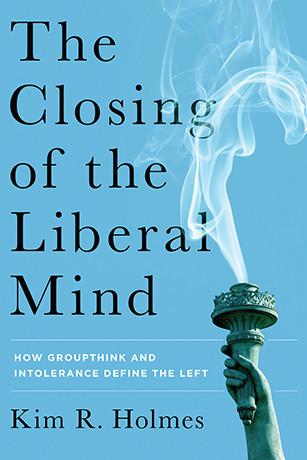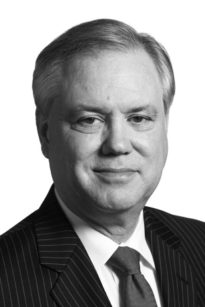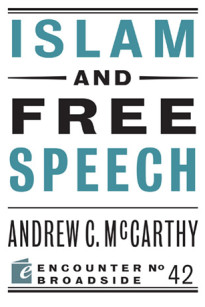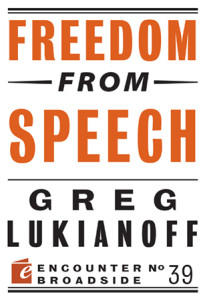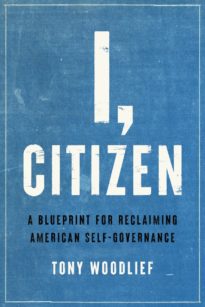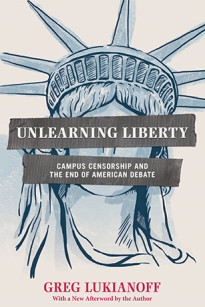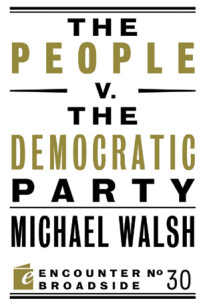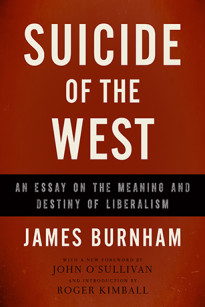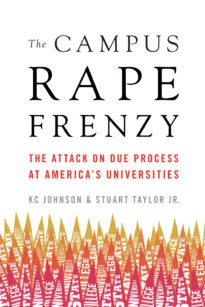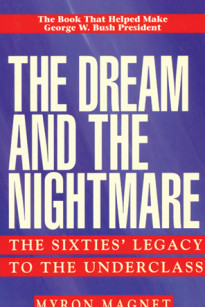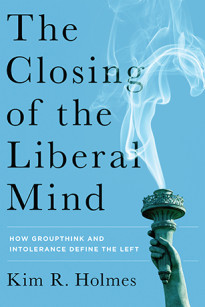When most people think of intolerance they imagine a racist taunting a black person.
Or they may envision a male chauvinist hurling bigoted insults at women. It seldom occurs to them that intolerance comes in all political shapes and sizes. A protestor storming a stage and refusing to let someone speak is intolerant. So, too, are campus speech codes that restrict freedom of expression. A city official threatening to fine a pastor for declining to marry a gay couple is every bit as intolerant as a right-winger wanting to punish gays with sodomy laws. Intolerance exists on the right and the left. It knows no exclusive political or ideological affiliation. It happens any time someone uses some form of coercion, either through government fiat or public shaming rituals, to restrict open debate and forcefully eliminate opponents from the playing field.
There is a word that describes this mentality. It is illiberal. For centuries we have associated the word “liberal” with open-mindedness. Liberals were people who were supposed to be tolerant and fair and who wanted to give all sides a hearing. They cared about everyone, not just their own kind. They wanted to include people in the exercise of liberty, not exclude them. They believed in pluralism. By contrast, illiberal people were hard-headed in their opinions and judgmental of others’ behaviors, hoping to control what other people thought and said and to cut off debate. In extreme cases they would even use violence to maintain political power and exclude certain kinds of people from having a say in their government.
Sadly, the kind of liberalism we used to know is fast disappearing from America. All too often people who call themselves progressive liberals are at the forefront of movements to shut down debates on college campuses and to restrict freedom of speech. They are eager to cut corners, bend the Constitution, make up laws through questionable court rulings, and generally abuse the rules and the Constitution in order to get their way. They establish “zero tolerance” regimes in schools where young boys are suspended for nibbling breakfast pastries into the shape of a gun. They claim to be unrelenting defenders of science, yet they will run scientists who deviate even slightly from climate change orthodoxy right out of the profession. They are supposedly great haters of bigotry but sometimes speak of Christians in the most bigoted manner imaginable as if they were no better than fascists. They like to make laws and regulations that over-criminalize everyday aspects of American life, to the point where people can be fined and imprisoned for violating some environmental or other regulation they never knew existed. They can be neighborhood bullies or petty tyrants on town or county councils, launching campaigns to stop people from building houses they do not like or going after the parents of “free range children.”
These are not theoretical threats, but actual incidents in recent years. Once known quintessentially as free thinkers, liberal intellectuals today are primarily keepers of a stifling ideological orthodoxy. They have become like Mandarin servants of today’s ruling class, presiding for example over academic departments teaching hopelessly incoherent subject matters (“queer studies,” anyone?) while eagerly awaiting the next government grant, contract, or invitation to a White House party.
American liberals are, in short, becoming increasingly illiberal. They are surrendering to the temptations of the closed mind. We must be careful about what this means. There are hard (sometimes very hard) and soft forms of illiberalism that exist regardless of their ideological (left-right) variations. The hard forms are totalitarian or authoritarian. They rely on the threat of force in some measure to maintain power, and they are invariably anti-democratic and anti-liberal. Think of communism, fascism, and all the various hybrids of authoritarian regimes, from Putin’s Russia to Islamist states that support terrorism. Soft forms of illiberalism, on the other hand, are not totalitarian or violent; they often observe outwardly the limits constitutional democracies place on the arbitrary use of power, but there is a suspicion that liberal democracies are not fully legitimate. Nationalists and military regimes see them as weak and corrupt, incapable of maintaining order and protecting national security. On the other side of the political spectrum, leftists often judge liberal democracies as economically and socially unjust because they are capitalistic. Since most liberal democracies still allow conservatives to have a voice in the democratic process, leftists find them wanting, and in some cases condemn them outright as being inherently oppressive (of racial and sexual minorities, for example) precisely because conservatives still have a voice in the democracy.
Certainly hard forms of illiberalism exist in America today. On the right they are manifest in the form of hard-core racists and nativists, and on the left in communists, anarchists, and any radical who openly threatens violence. But soft illiberalism is present as well, and in America today it is not only pervasive. Most of its growth and energy is a left-wing phenomenon.
This brings me to a word about definitions. Historically, a progressive liberal is someone who imbibes the intellectual nectars of both progressivism and classic liberalism. The progressive tradition is easily recognizable; it is the legacy of such prominent progressives from the turn of the 20th century as Herbert Croly, John Dewey, Teddy Roosevelt, Woodrow Wilson, and others. The classic liberal tradition is less known, and as a result our understanding of it is murkier. Classic liberalism is a set of ideas about individual liberty and constitutional government inherited from the moderate Enlightenment. In America those ideas influenced the Revolution and the founding of the Republic. In Europe they were taken up in the 19th century by such liberals as Benjamin Constant, David Ricardo, Alexis de Tocqueville, François Guizot, and John Stuart Mill.
Although originally swimming in the same intellectual stream, American progressives and classic liberals started parting company in the late 19th century. Progressives initially clung to freedom of expression and the right to dissent from the original liberalism; but under the influence of socialism and social democracy, they gradually moved leftward to the point where today they largely hold classic liberalism—especially as manifested in small government conservatism and libertarianism—in contempt. Thus what we call a “liberal” is not historically a liberal at all but a progressive social democrat who sometimes clings to the old liberal notion of individual liberty when it is convenient (as in supporting abortion or decrying the “national security” state) but who more often finds individual liberties and freedom of conscience to be barriers to building the progressive welfare state.
To untangle this confusing web of intellectual history, we need a more accurate historical rendering of what “progressive liberals” actually are. If they are not really liberals, then what are they? As this volume will explore in more depth, they are postmodern leftists. A postmodernist is someone who believes that ethics are utterly and completely relative, and that human knowledge is, quite simply, whatever the individual, society, or political powers say it is. When mixed with radical egalitarianism, postmodernism produces the agenda of the radical cultural left—namely, sexual and identity politics and radical multiculturalism, causes that have largely taken over the progressive liberal agenda and given the Democratic Party most of its energy, ideas, and sadly, illiberal values imported from such movements as neo-Marxism. Combined with the dreams of the old social democratic–socialist left, of either dismantling or radically containing capitalism, the culture of the postmodern left today is a very potent force in politics.
Many books discuss the intolerance of the left. Allan Bloom’s The Closing of the American Mind (1987), which inspired the title for this book, focused on the American academy. Other recent books lament the liberal groupthink in the U.S media. I intend to paint a much broader picture. I will show how the decline of liberalism has been long in the making, and that the illiberalism these authors describe in the media and academic worlds is now widespread in the political system and rapidly gaining ground in society. Illiberalism is not only the defining feature of what we call progressive liberalism today; it is, in fact, the predominant worldview of Barack Obama’s Democratic Party. The focus of this discussion, however, will not be on that party, since political parties have often changed their platforms and priorities to get elected. The focus instead will be how deeply this progressive illiberalism infects many aspects of our society today—so much so that our very identity as the nation that championed liberty in the 20th century may not keep that title for very long in the 21st.
I would not wish to leave the readers of this book entirely without hope. Despite the rather gloomy prognosis I offer for the future of American liberalism, it may still be possible to save it from the ravages of the postmodern left. Moderate liberals and conservatives have one thing in common. Neither has an interest in the triumph of illiberal values in America. Both should like to see a country in which freedom of expression, open intellectual inquiry, constitutional democracy, and the rule of law prevail. If not a unified front, at least a tacit alliance against illiberalism and extremism may be possible. However, in order for this to happen, liberals have some very deep soul-searching to do. Frankly, it should not be left up to a conservative to point out the vulnerabilities that threaten to destroy their movement. Liberals themselves should be concerned and stepping in to save liberalism from itself.
A word about the purpose of the book. It is ultimately about ideas. It is about how they have evolved and are shaping today’s politics and culture. Mixing intellectual history with an analysis of contemporary politics is tricky. People always wonder whether the ideas developed by intellectuals lead or merely follow the broader evolution of historical events. In reality they do both, but I do believe that ideas developed by serious thinkers, once they are digested by the popular political culture, are more influential than many people think. It is not about everyone being mini-philosophers, but people looking for reasons and justifications to do what they do. This does not happen in an historical vacuum. Historical ideas, like ideas in general, are like lighthouses helping people to navigate in the darkness. Ships are already offshore anyway, fighting the currents that take them this way or that; but to the extent that a ship’s captain, like all human beings, wants to find his way home, he will latch on to known sources of light to show the way. For a culture such as ours, ideas are these known sources of light, and we underestimate them at our peril.
Not everything happening today in the name of progressive liberalism can be traced back to its intellectual history. But much of it can be. That, at least, is the slice of the matter that I hope to add to the current debate about the nature of contemporary American liberalism.
